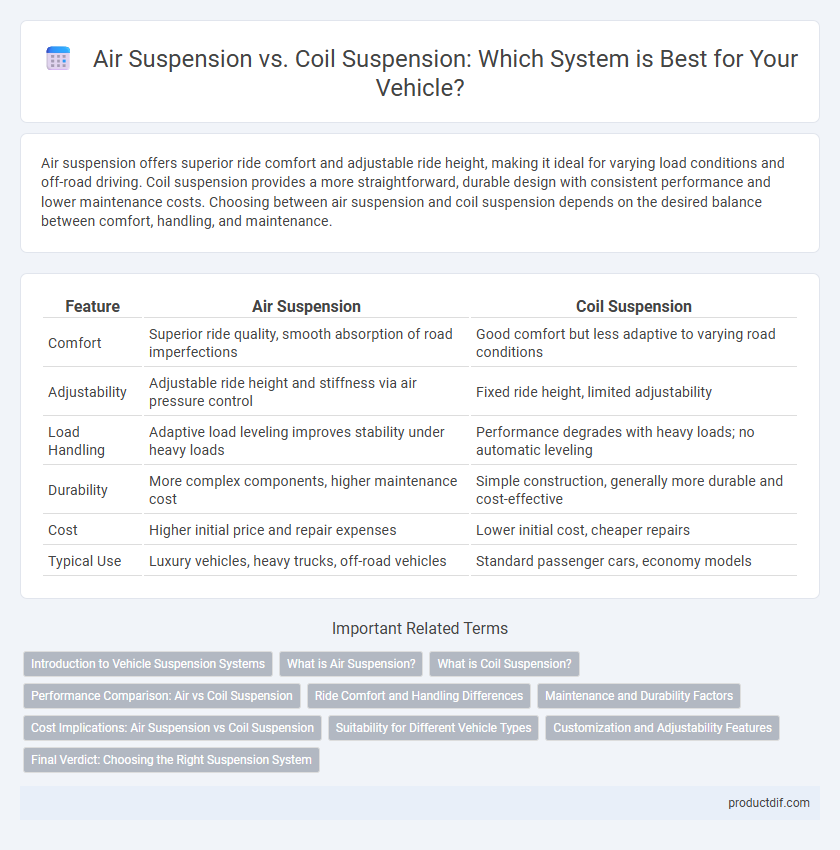Air suspension offers superior ride comfort and adjustable ride height, making it ideal for varying load conditions and off-road driving. Coil suspension provides a more straightforward, durable design with consistent performance and lower maintenance costs. Choosing between air suspension and coil suspension depends on the desired balance between comfort, handling, and maintenance.
Table of Comparison
| Feature | Air Suspension | Coil Suspension |
|---|---|---|
| Comfort | Superior ride quality, smooth absorption of road imperfections | Good comfort but less adaptive to varying road conditions |
| Adjustability | Adjustable ride height and stiffness via air pressure control | Fixed ride height, limited adjustability |
| Load Handling | Adaptive load leveling improves stability under heavy loads | Performance degrades with heavy loads; no automatic leveling |
| Durability | More complex components, higher maintenance cost | Simple construction, generally more durable and cost-effective |
| Cost | Higher initial price and repair expenses | Lower initial cost, cheaper repairs |
| Typical Use | Luxury vehicles, heavy trucks, off-road vehicles | Standard passenger cars, economy models |
Introduction to Vehicle Suspension Systems
Vehicle suspension systems are critical for ensuring road comfort, handling, and safety by absorbing shocks from uneven surfaces. Air suspension uses compressed air to provide adjustable cushioning, enhancing ride quality and load adaptability compared to traditional coil suspension, which relies on metal springs for consistent support. Selecting between air and coil suspension impacts vehicle dynamics, maintenance needs, and overall performance based on specific driving conditions and vehicle types.
What is Air Suspension?
Air suspension uses compressed air in flexible bellows instead of traditional metal springs, providing adjustable ride height and enhanced comfort by adapting to various road conditions. The system includes air compressors, airbags, and electronic controls to maintain optimal vehicle stability and load handling. This technology improves ride quality by absorbing shocks more effectively and allows customization for different driving environments.
What is Coil Suspension?
Coil suspension uses helical steel springs to absorb shocks and maintain vehicle stability, providing a smoother and more comfortable ride compared to traditional leaf springs. Common in passenger cars and light trucks, coil suspensions offer precise handling and better wheel alignment control. This system is especially effective in urban and highway driving, where comfort and maneuverability are priorities.
Performance Comparison: Air vs Coil Suspension
Air suspension provides superior ride comfort and adjustable ride height, enhancing vehicle handling across diverse terrains and load conditions. Coil suspension offers consistent performance with simpler mechanics, delivering reliable handling and durability in off-road and high-impact scenarios. Air suspension systems are often preferred in luxury and performance vehicles for their adaptability, while coil suspensions remain popular in heavier-duty and off-road vehicles due to their robustness.
Ride Comfort and Handling Differences
Air suspension offers superior ride comfort by automatically adjusting to road conditions and vehicle load, providing a smoother and more adaptable driving experience. Coil suspension generally delivers better handling and stability, enhancing cornering performance and responsiveness, especially on sporty or performance-oriented vehicles. Choosing between the two depends on the priority between luxury ride quality and precise vehicle control.
Maintenance and Durability Factors
Air suspension systems require regular inspection of air springs, compressors, and valves to prevent leaks and maintain optimal performance, while coil suspensions generally demand less frequent maintenance due to their simpler mechanical design. Durability of air suspension can be compromised by environmental factors like moisture and road debris, which may cause component wear or failure over time; coil suspensions tend to be more robust and resilient in harsh conditions. Proper maintenance of air suspension extends its lifespan but is often costlier compared to the more durable and low-maintenance coil suspension system.
Cost Implications: Air Suspension vs Coil Suspension
Air suspension systems typically involve higher upfront costs due to advanced components like air compressors, electronic controllers, and sensors, leading to increased installation expenses compared to coil suspension. Maintenance and repair costs for air suspension are generally more expensive, as air springs and compressors may require periodic replacement, whereas coil suspensions use durable steel springs with lower maintenance needs. Over the vehicle's lifespan, coil suspension tends to be more cost-effective, making it a preferred choice for budget-conscious buyers seeking reliability and reduced long-term expenses.
Suitability for Different Vehicle Types
Air suspension systems excel in luxury and heavy-duty vehicles, offering adjustable ride height and superior comfort for variable loads and road conditions. Coil suspension is better suited for compact cars and sports vehicles due to its simplicity, lightweight design, and responsive handling characteristics. Selecting the appropriate suspension depends on vehicle use, with air suspension favoring versatility and coil suspension prioritizing agility and cost-effectiveness.
Customization and Adjustability Features
Air suspension systems offer superior customization and adjustability by allowing drivers to modify ride height and stiffness electronically, adapting to various terrains and load conditions in real-time. Coil suspensions provide a more fixed setup with limited adjustability, requiring mechanical changes for customization, making them less flexible compared to air suspensions. The advanced control features of air suspension enhance comfort and performance, especially for vehicles requiring frequent load adjustments or off-road capability.
Final Verdict: Choosing the Right Suspension System
Air suspension offers superior ride comfort and adjustable ride height, making it ideal for luxury vehicles and uneven terrains, while coil suspension provides durability and simplicity, suited for off-road and performance applications. The final decision depends on driving preferences, vehicle use, and budget considerations, with air suspension favored for smoothness and adaptability and coil suspension valued for cost-effectiveness and reliability. Selecting the right suspension system enhances vehicle handling, safety, and overall driving experience.
Air Suspension vs Coil Suspension Infographic

 productdif.com
productdif.com